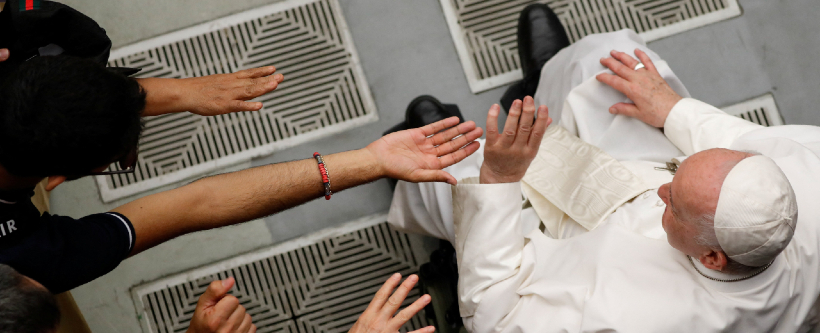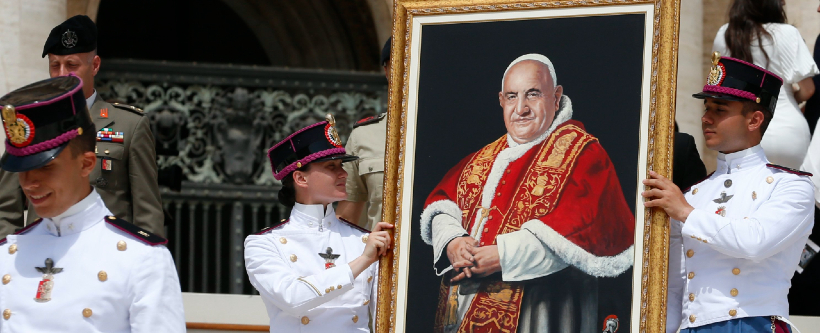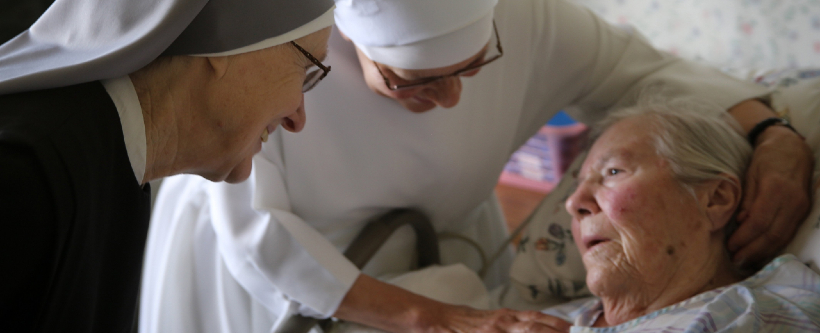‘God is greater than our sin. Let us not forget this: God is greater than our sin! … Let’s repeat this together…’
THE HOLY FATHER’S CATECHESIS
Dear Brothers and Sisters, good morning!
Today we finish the catecheses on mercy in the Old Testament, and we do so meditating on Psalm 51, known as the Miserere. It is a penitential prayer in which the request for forgiveness is preceded by the confession of guilt in which the Psalmist, allowing himself to be purified by the love of the Lord, becomes a new creature, capable of obedience, of firmness of spirit and of sincere praise.
The “title” that the ancient Jewish tradition gave this Psalm makes reference to King David and his sin with Bathsheba, the wife of Uriah the Hittite. We know the affair well. King David, called by God to tend His People and to lead them on paths of obedience to the Divine Law, betrays his mission and, after having committed adultery with Bathsheba, has her husband killed. Terrible sin! Nathan, the prophet, reveals his guilt to him and helps him to acknowledge it. It is the moment of reconciliation with God, in the confession of his sin. And here David was humble; he was great! Whoever prays with this Psalm is invited to have the same sentiments of repentance and trust in God that David had, when he repented and, although being King, humbled himself, without fearing to confess his fault and show his misery to the Lord, convinced, however, of the certainty of His mercy. And what he did was not a small sin, a little fib: he had committed adultery and murder!
The Psalm begins with these words of supplication:
“Have mercy on me, God, in accord with your merciful love;
in your abundant compassion blot out my transgressions.
Thoroughly wash away my guilt;
and from my sin cleanse me. (v. 3-4)
The invocation is addressed to the God of mercy because, moved by a great love as that of a father or of a mother, He has pity, namely, He grants grace, shows His favor with benevolence and understanding. It is a heartbroken appeal to God, the only one who can free from sin. Very plastic images are used: blot out, wash me, cleanse me. Man’s real need is manifested in this prayer: the only thing that we truly need in our life is to be forgiven, freed from evil and its consequences of death. Unfortunately, life often makes us experience these situations and, in them, we must first of all trust in mercy. God is greater than our sin. Let us not forget this: God is greater than our sin! “Father, I don’t know how to say it, I have committed so many <sins>!” God is greater than all the sins that we can commit. God is greater than our sin. Shall we say it together? All together: “God is greater than our sin!” Once again: “God is greater than our sin!” And His love is an ocean in which we can immerse ourselves without fear of being overwhelmed: for God, to forgive means to give us the certainty that He never abandons us. Whatever we might reprove ourselves for, He is still and always greater than everything (cf. 1 John 3:20), because God is greater than our sin.
In this connection, whoever prays with this Psalm seeks forgiveness, confesses his fault; however, acknowledging it, he celebrates God’s justice and holiness. And then, he requests grace and mercy again. The Psalmist entrusts himself to God’s goodness; he knows that divine forgiveness is extremely effective, because it creates that which it says. Sin is not hidden, but it is destroyed and blotted out; however, it is blotted out in fact from the root, not as they do at the drycleaners, when we take a garment to have a stain removed. No! God blots out our sin in fact from the root, all of it! Therefore, the penitent becomes pure again, every stain is eliminated and he is now whiter than uncontaminated snow. We are all sinners. Is this true? If one of you does not know himself to be a sinner, let him raise his hand … No one! We are all so. With forgiveness, we sinners become new creatures, brimming with the Spirit and full of joy. Now a new reality begins for us: a new heart, a new spirit, a new life. We, forgiven sinners, who received divine grace, can also teach others not to sin anymore. “But Father, I’m weak, I fall, fall.” “But if you fall, rise! Rise!” When a child falls, what does he do? He raises his hand to his mother, to his father, so that he is helped to get up. We must do the same! If you fall into sin out of weakness, raise your hand: the Lord will take it and help you to rise. This is the dignity of God’s forgiveness. The dignity that God’s forgiveness gives us is that of rising, of standing always, because He created man and woman to stand.
The Psalmist says:
“A clean heart create for me, God;
renew within me a steadfast spirit …..
I will teach the wicked your ways,
that sinners may return to you. (vv. 12.15).
Dear brothers and sisters, we are all in need of God’s forgiveness, and it is the greatest sign of His mercy – a gift that every forgiven sinner is called to share with every brother or sister he meets. All those that the Lord has put at our side, relatives, friends, colleagues, parishioners … all are, as we are, in need of God’s mercy. It is lovely to be forgiven, but you also, if you want to be forgiven, forgive in turn. Forgive! May the Lord grant us, through the intercession of Mary, Mother of Mercy, to be witnesses of His forgiveness, which cleanses the heart and transforms our life. Thank you.
Greeting to the Italian-speaking Pilgrims
In the typical joy of the Resurrection, my thought goes to the dear Deacons of the Society of Jesus, accompanied by their Superiors and relatives, and it is my heartfelt hope that your Jubilee pilgrimage is rich in spiritual fruits for the benefit of the whole Society. I embrace you spiritually, beloved boys and girls from different Deaneries, Parishes and Oratories of the Archdiocese of Milan, as well as those of the Diocese of Cremona, on the occasion of your Profession of Faith. To you and to all your contemporaries, in particular the students of the High Schools of the Diocese of Ravenna-Cervia, I hope that you will live in fullness the Easter message, always faithful to your Baptism and joyful witnesses of Christ dead and risen for us.
I greet the Franciscan Missionary Sisters of Mary, at the end of their General Chapter; and the faithful of the Parish of the Most Holy Sacrament of Bari, on the occasion of the centenary of its foundation. It is my heartfelt wish that your visit to Rome is for you all an occasion of spiritual renewal.
An affectionate thought goes to you, dear sick, whom I exhort to look constantly to Him, who conquered death and who helps us to accept suffering as a precious occasion of redemption and salvation. Finally, I invite you, dear newlyweds, to live your daily family experience with your gaze turned to the Risen Christ, who at Easter was immolated for us.







Facebook Comments